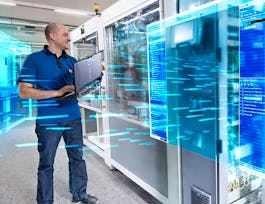This course provides an intermediate-level exploration of Robotics Process Automation (RPA) within the realm of smart manufacturing, catering to manufacturing engineers, process designers, automation technologists, and quality assurance specialists. Over a duration of 4 hours, participants will delve into the foundational concepts of RPA, its integration with existing manufacturing systems, and its transformative impact on production efficiency and quality control. Through real-world case studies, learners will analyze successful RPA implementations, understand deployment challenges, and acquire strategies for effective integration.



Recommended experience
What you'll learn
Define the key components of RPA in manufacturing.
Describe the integration of RPA with existing manufacturing systems.
Analyze case studies to identify effective RPA strategies.
Evaluate the impact of RPA on production efficiency and quality control.
Skills you'll gain
- Automation
- Industrial Engineering
- Manufacturing Operations
- Facility Management and Maintenance
- IT Automation
- Process Engineering
- Engineering
- Product Quality (QA/QC)
- Manufacturing and Production
- Manufacturing Processes
- Business Process Management
- Robotic Process Automation
- Production Process
- Plant Operations and Management
- Business Process Automation
- Quality Management Systems
- Production Management
- Production Line
- Quality Control
- Quality Assurance and Control
Details to know

Add to your LinkedIn profile
4 assignments
See how employees at top companies are mastering in-demand skills


Earn a career certificate
Add this credential to your LinkedIn profile, resume, or CV
Share it on social media and in your performance review

There are 4 modules in this course
Module 1 provides a comprehensive introduction to Robotics Process Automation (RPA) within the manufacturing sector, covering fundamental concepts, deployment strategies, integration techniques, and impact measurement methodologies.
What's included
10 videos4 readings1 assignment2 discussion prompts
Module 2 focuses on introducing learners to the development of robotic process automation (RPA) bots using UiPath. It covers the fundamentals of RPA development, setting up the UiPath environment, and building basic assisted bots.
What's included
10 videos3 readings1 assignment2 discussion prompts
Module 3 focuses on the development of non-assisted bots, primarily utilizing UiPath as the RPA platform. Learners will delve into creating unattended bots for data processing, automating complex tasks, and managing bots post-development using UiPath Orchestrator.
What's included
10 videos3 readings1 assignment2 discussion prompts
Module 4 focuses on the integration of Robotic Process Automation (RPA) with cutting-edge technologies such as the Internet of Things (IoT) and Industry 4.0 within the manufacturing sector. It explores how RPA drives innovation, scalability, and efficiency in modern manufacturing operations.
What's included
11 videos3 readings1 assignment2 discussion prompts
Instructor

Offered by
Why people choose Coursera for their career




Recommended if you're interested in Physical Science and Engineering

University at Buffalo

University at Buffalo

L&T EduTech

Starweaver

Open new doors with Coursera Plus
Unlimited access to 10,000+ world-class courses, hands-on projects, and job-ready certificate programs - all included in your subscription
Advance your career with an online degree
Earn a degree from world-class universities - 100% online
Join over 3,400 global companies that choose Coursera for Business
Upskill your employees to excel in the digital economy


